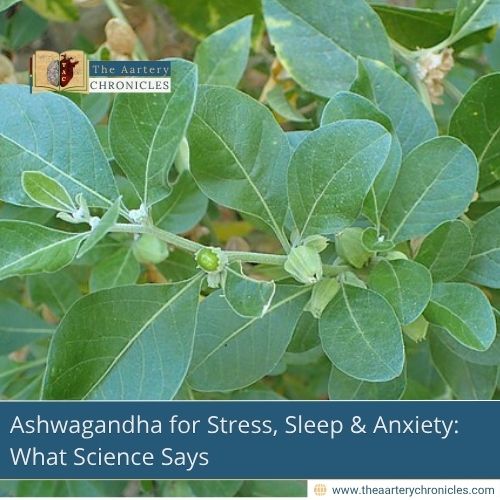

Ashwagandha for Stress, Sleep & Anxiety: What you need to know
Summary: This comprehensive review explores the adaptogenic herb Withania somnifera (Ashwagandha), widely used in traditional medicine for stress, anxiety, and sleep disorders. The article summarises evidence from clinical trials, highlighting its efficacy, optimal doses, and safety concerns, particularly its effects on cortisol, thyroid, and liver. It also examines regulatory advisories from global health bodies.
Ashwagandha for Stress, Anxiety & Sleep: A Scientific Deep Dive
Can this ancient root calm your mind and help you sleep better? Let’s explore the science behind ashwagandha and what it means for your well-being.
What Is Ashwagandha?
Withania somnifera, better known as ashwagandha, is an evergreen shrub native to parts of Asia, Africa, and Europe. Its Sanskrit name translates to “smell of a horse” (ashwa = horse, gandha = smell), referencing the scent of its root. Commonly called Indian ginseng or winter cherry, it is not related to true ginseng botanically.

- Ashwagandha has long been a cornerstone in Ayurvedic and Unani medicine, revered as an adaptogen, a substance that helps the body deal with stress, anxiety or fatigue.
- The root and leaves of the plant vary in concentrations of phytochemicals. Most supplements use root extracts, though some combine root and leaf. The term somnifera, Latin for “sleep-inducing,” reflects its traditional use for calming the mind.
- Its medicinal value comes from phytochemicals like withanolides and alkaloids, which contribute to its stress-reducing and neuroprotective properties.
Stress & Anxiety: What Do Studies Reveal?
A 2021 systematic review evaluated 7 studies (491 Indian adults with stress or anxiety) and found that ashwagandha (240–1,250 mg/day) significantly reduced
- Anxiety
- Insomnia
- Fatigue
- Cortisol levels
It was found out that doses of 500–600 mg/day showed stronger results.

Subsequent trials have echoed these findings:
- NooGandha Trial (Remenapp. A et al, 2021): 60 participants took either 225 mg or 400 mg/day. Both doses improved stress, anxiety, and cortisol levels.
- Prolanza Trial (India, Kumarpillai Gopukumar et al, 2021): 130 adults showed improvements in stress, sleep, memory, and focus over 90 days on 300 mg/day of root extract.
- Shagandha Trial (India, Muhammed Majeed et al, 2023): 54 adults showed decreased anxiety and improved multitasking and quality of life after 60 days of 500 mg/day with piperine.
- Gaia Herbs Study (University of Colorado, Cynthia Baker et al, 2022): 60 students taking 700 mg/day noted increased calmness, better sleep, and mental clarity.
- Witholytin Trial (Stephen J Smith et al, 2023): 120 adults with fatigue noted reduced fatigue but no significant stress reduction.
- WFSBP and CANMAT (Jerome Sarris et al. 2022) provisionally recommend 300–600 mg/day of ashwagandha extract (standardized to 5% withanolides) for generalized anxiety disorder.
Can Ashwagandha Improve Sleep?
Emerging evidence indicates that ashwagandha may enhance sleep quality, especially in people with insomnia.

- Shoden Trial (India, Abhijit Deshpande et al. 2020): 150 adults with sleep issues took 120 mg/day of extract for 6 weeks. It was found out that 72% reported significant improvement in sleep quality versus 29% in the placebo group.
- KSM-66 Trial (Deepak Langade et al. 2021): 80 adults (with and without insomnia) on 600 mg/day showed better
- Sleep onset
- Sleep time
- Reduced anxiety
A 2021 meta-analysis combining 5 trials (372 adults) found a small but meaningful benefit in improving sleep, especially at 600 mg/day for at least 8 weeks.
Is Ashwagandha Safe?
In short-term trials (up to 3 months), ashwagandha is well tolerated.. The most commonly reported adverse events (>5%) were mild and predominantly transient, including
- Somnolence
- Epigastric pain or discomfort
- Loose stools
Less frequently reported adverse events included
- Giddiness
- Drowsiness
- Hallucinations
- Vertigo
- Nasal congestion (rhinitis), cough, and cold
- Decreased appetite
- Nausea
- Constipation
- Dry mouth
- Nocturnal muscle cramps
- Blurred vision
- Hyperacidity
- Skin rash
- Weight gain
However, safety concerns arise in specific cases.
Effect of Ashwagandha on Liver Health

Several case reports link ashwagandha to liver injury. For instance:
- A 20-year-old in Japan developed liver dysfunction while combining ashwagandha with antianxiety meds.
- 5 individuals (ages 21–62) taking 450–1,350 mg/day reported jaundice, nausea, and hyperbilirubinemia, which reversed after stopping the supplement.
Product contamination or the use of combination formulations may have been contributing factors, particularly as not all products were independently verified for purity or composition.
Thyroid Effects of Ashwagandha

Ashwagandha may increase thyroid hormone levels:
- One study showed elevated T4 in men taking 500 mg/day.
- Another showed increased T3 and T4, and reduced TSH in subclinical hypothyroid patients on 600 mg/day.
- There is a potential risk of thyrotoxicosis associated with Ashwagandha In one reported case, a patient developed thyrotoxicosis following self-administration of Ashwagandha root extract, which she had begun taking for stress and anxiety relief. The condition emerged after approximately two months of consistent daily intake at a dose of 1950 mg.
Ashwagandha might interact with
- Thyroid medications
- Antidiabetic drugs
- Sedatives
- Immunosuppressants
Effect of Ashwagandha on Pregnancy and Hormone-Sensitive Conditions
- Pregnant women are advised against ashwagandha due to potential abortifacient effects. Though the American Herbal Pharmacopoeia (AHP) clarified that their data was misrepresented, caution persists.
- Denmark banned ashwagandha in 2023, citing risks to reproductive and endocrine health.
- ANSES (France) advised caution in 2024 for pregnant/breastfeeding women and those with endocrine disorders.
- Ashwagandha may boost testosterone, so it may not be safe for men with hormone-sensitive prostate cancer.
Conclusion: Should You Try Ashwagandha?
Ashwagandha may help reduce stress and anxiety and improve sleep, especially when taken as 300–600 mg/day of a standardized extract. Most short-term users experience mild or no side effects, and clinical trials show promising outcomes.
However, long-term safety is still unclear, and potential side effects on the liver, thyroid, and hormonal balance warrant caution, particularly in pregnant women, individuals with thyroid disorders, or those with hormone-sensitive cancers.
If you’re considering ashwagandha:
- Choose reputable, standardised extracts.
- Stick to short-term use unless under medical supervision.
- Avoid if pregnant or managing liver, thyroid, or hormone-related health issues.

Dane
I am an MBBS graduate and a dedicated medical writer with a strong passion for deep research and psychology. I enjoy breaking down complex medical topics into engaging, easy-to-understand content, aiming to educate and inspire readers by exploring the fascinating connection between health, science, and the human mind.








